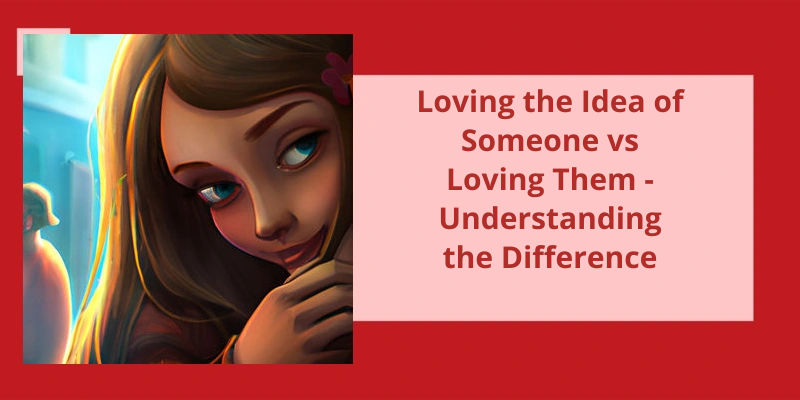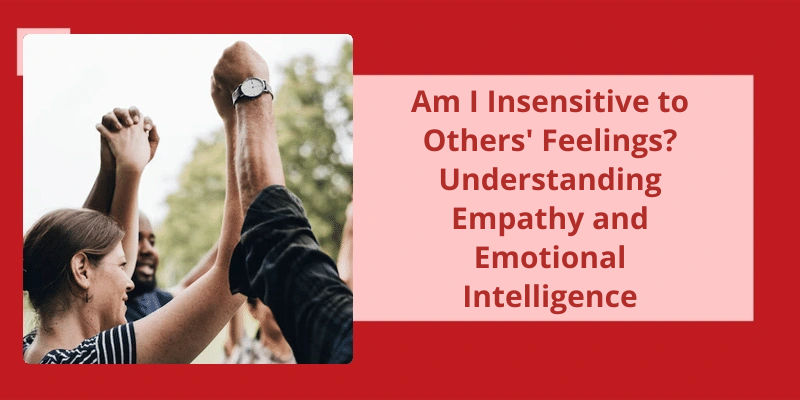It's easy to fall in love with an idea, an ideal or a version of someone that you’ve created in your mind. You may be enamored with their looks, their job, their personality or their social status, without truly knowing who they’re as a person. But loving someone is much more complex and involves a deeper understanding and appreciation of their flaws, quirks and vulnerabilities. It means accepting them for who they are, imperfections and all, and cherishing them unconditionally. True love isn’t just a feeling, it's a choice and a commitment to constantly work on building a meaningful and fulfilling relationship. Therefore, it's important to recognize the difference between simply loving the idea of someone and actually loving them, in order to avoid disappointment, heartbreak and unhappiness in the long run.
What Does It Mean to Love the Idea of Someone but Not Them?
If you’re truly in love with someone, you’ll feel a deep sense of connection and commitment towards them. You’ll be willing to put in the effort to maintain a healthy and fulfilling relationship. However, if you simply love the idea of someone, you may feel more infatuated than truly devoted to your partner.
The concept of loving someone from a distance or holding on to an idealized version of them isn’t uncommon. It’s often fueled by our own expectations and desires, and not by a true understanding of who the person really is. In fact, sometimes we may project our own idealized version onto others, creating an unrealistic image that’s impossible for them to live up to.
Another factor that contributes to loving an idea instead of a person is the fear of intimacy. For some people, getting too close to someone can be frightening and overwhelming. They may feel more comfortable with the idea of love rather than the reality of it, preferring to keep their distance and avoid emotional vulnerability.
Ultimately, loving the idea of someone but not them can be damaging to both parties in a relationship. It can lead to unrealistic expectations, disappointment, and even resentment. It’s important to be honest with yourself and your partner about your feelings and intentions. Take the time to get to know the real person behind the idealized version, and be willing to accept them as they are, flaws and all.
Love is a complex and multifaceted emotion that can’t be reduced to a simple concept or ideal. It requires depth, commitment, and genuine connection with another person. While it’s natural to have fantasies and expectations about love, it’s important to recognize when they aren’t based in reality. By being honest with ourselves and our partners, we can create strong and healthy relationships that are built on authentic love and mutual respect.
How to Navigate a Relationship When One Partner Realizes They’re in Love With the Idea of the Other Rather Than the Person Themselves.
This article discusses the challenges that arise when someone in a relationship realizes they’re more in love with the idea of the other person rather than the person themselves. It provides guidance on how to address this issue and navigate the relationship going forward.
Love is a complex and abstract concept that’s been the subject of many debates and discussions throughout human history. It can be described as a mix of emotions, behaviors, and beliefs that are associated with intense feelings of affection, protection, warmth, and respect toward another person. However, the concept of love extends beyond human relationships to include non-human animals, principles, and religious beliefs. In this article, we will delve deeper into the idea of love and explore it’s fascinating nuances and complexities.
What Is the Idea of Love?
The idea of love is one of the most complex and multifaceted concepts in human history. It encompasses a range of emotions, behaviors, and beliefs that are associated with strong feelings of affection, protectiveness, warmth, and respect for another person. A myriad of different cultural, historical, social, and personal factors shape our experience of love, making it a highly subjective and dynamic concept that evolves over time.
At it’s core, love is about connection and intimacy. It reflects our deep-seated need for social interaction and meaningful relationships with others. Whether we’re talking about romantic love, familial love, platonic love, or any other form of love, the underlying themes of connection and intimacy always remain central.
However, love isn’t just an emotional experience, but also encompasses a range of behaviors and actions. These can include physical touch, verbal affirmations, acts of service, and quality time spent together. These behaviors and actions serve to reinforce the emotional bond between two people, and are an essential component of a healthy and fulfilling love relationship.
The idea of love also encompasses a range of beliefs and values. These can include attitudes towards commitment, trust, honesty, loyalty, and sacrifice. While individual beliefs and values may vary, a shared set of beliefs and values is often essential for a successful love relationship. This shared foundation helps to create a sense of unity and purpose within the relationship, allowing it to weather the ups and downs of life.
It’s not uncommon to fall in love with the idea of someone, but what happens when reality falls short of your idealized version of them? Can you still love them for who they are, or will your love ultimately be confined to the image you’ve crafted in your mind? Let’s explore this phenomenon further and delve into the complexities of loving someone for who they truly are versus loving an idealized version of them.
Can You Love the Idea of Someone but Not Them?
This phenomenon is often magnified in the age of social media where we can easily create an image of someone in our minds based on curated online personas. It’s easy to fall for a version of someone that we create for ourselves based on the snippets of their life that we see online. However, this version may be completely different from who they’re in reality.
It’s also possible to idealize someone based on their actions or accomplishments. We may love the idea of being with someone who’s successful, kind, or funny without actually knowing them on a personal level. This can lead to disappointment when we eventually do get to know them and realize that they don’t live up to our expectations.
In some cases, our love for the idea of someone may be rooted in our own desires or insecurities. We may project our own wants and needs onto them, creating a version of them that fits into our own idealized world. This can be dangerous as it can prevent us from seeing and accepting who they truly are.
It’s important to be aware of our own tendencies to idealize others and understand that often, the people we’re infatuated with aren’t who we think they are. It’s still possible to develop a genuine connection with someone, even if they don’t match the image we’ve created in our minds. This requires us to be open-minded, communicate honestly, and be willing to accept flaws and imperfections.
At the end of the day, loving the idea of someone can be exciting, but it’s not sustainable in the long run. Eventually, we will need to face the reality of who they truly are and decide if we’re willing to accept them as they’re or move on to find someone who truly aligns with our values and desires.
Conclusion
True love is a deep connection that goes beyond the surface level of simply liking someone's appearance or personality traits. It requires time, effort, and understanding to truly love and accept someone for who they are, with all their imperfections and flaws. Loving the idea of someone may seem exciting and romantic at first, but it's ultimately unsustainable and unfulfilling. To truly experience the beauty of love, it's important to be open, honest, and vulnerable with yourself and with your partner. Only then can you build a strong foundation for a lasting and meaningful relationship based on acceptance, trust, and respect.






